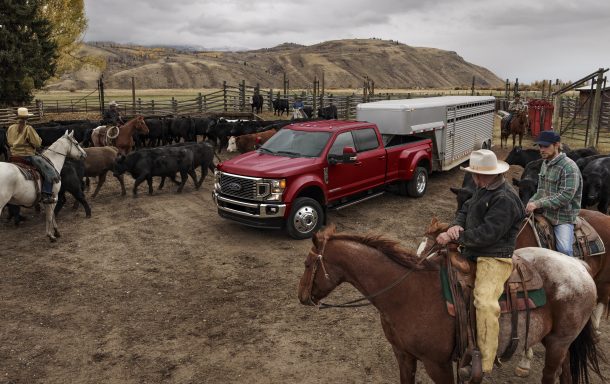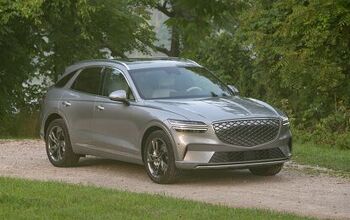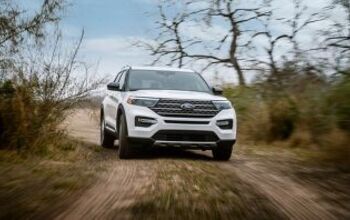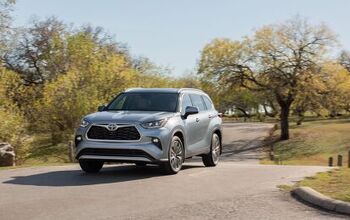Ford Says Electric Super Duty Trucks Aren't Happening

While Ford’s F-150 is slated for electrification, Super Duty versions of the F-Series are not. On Monday, the automaker told industry analysts that HD EVs weren’t in the cards — adding that customers can still expect all-electric versions of the Mach-E “Mustang” and Transit van.
“Our goal is to build a profitable electric vehicle portfolio,” John Lawler, Ford chief financial officer, explained during the forum hosted by Dan Levy of Credit Suisse. “To do that, we need to leverage our strengths and the scale that we have. We’re being very strategic about the platforms that we choose.”
Why bother building a non-competitive HD pickup to a customer base that only cares about whether or not it can haul 35,000 pounds for the entire day? The energy density of modern electric cars simply isn’t there, resulting in a hypothetical pickup that could theoretically haul monstrous loads a relatively short distance before needing to recharge. We doubt such a vehicle was even seriously considered by Ford after it crunched the numbers. Prohibitive development costs combined with gaps in battery technology undoubtedly killed the concept before it got off the ground.
According to the Detroit Free Press, any reasonable doubts to the contrary were removed by Kumar Galhotra, president of Ford Americas and International Markets Group. “At the moment, we do not have any plans to go into heavy duty with battery-electric vehicles,” he said.
That will change the second Ford thinks it’s profitable, however. CEO Jim Farley indicated that the automaker was interested in selling EVs to the commercial market, and not just private sales, during Ford’s third-quarter earnings call. If there’s a sudden leap forward in battery tech that can facilitate heavy-duty work without nullifying range and a customer base to sell to, Ford will probably begin development.
[Image: Ford Motor Co.]

A staunch consumer advocate tracking industry trends and regulation. Before joining TTAC, Matt spent a decade working for marketing and research firms based in NYC. Clients included several of the world’s largest automakers, global tire brands, and aftermarket part suppliers. Dissatisfied with the corporate world and resentful of having to wear suits everyday, he pivoted to writing about cars. Since then, that man has become an ardent supporter of the right-to-repair movement, been interviewed on the auto industry by national radio broadcasts, driven more rental cars than anyone ever should, participated in amateur rallying events, and received the requisite minimum training as sanctioned by the SCCA. Handy with a wrench, Matt grew up surrounded by Detroit auto workers and managed to get a pizza delivery job before he was legally eligible. He later found himself driving box trucks through Manhattan, guaranteeing future sympathy for actual truckers. He continues to conduct research pertaining to the automotive sector as an independent contractor and has since moved back to his native Michigan, closer to where the cars are born. A contrarian, Matt claims to prefer understeer — stating that front and all-wheel drive vehicles cater best to his driving style.
More by Matt Posky
Latest Car Reviews
Read moreLatest Product Reviews
Read moreRecent Comments
- Honda1 Unions were needed back in the early days, not needed know. There are plenty of rules and regulations and government agencies that keep companies in line. It's just a money grad and nothing more. Fain is a punk!
- 1995 SC If the necessary number of employees vote to unionize then yes, they should be unionized. That's how it works.
- Sobhuza Trooper That Dave Thomas fella sounds like the kind of twit who is oh-so-quick to tell us how easy and fun the bus is for any and all of your personal transportation needs. The time to get to and from the bus stop is never a concern. The time waiting for the bus is never a concern. The time waiting for a connection (if there is one) is never a concern. The weather is never a concern. Whatever you might be carrying or intend to purchase is never a concern. Nope, Boo Cars! Yeah Buses! Buses rule!Needless to say, these twits don't actual take the damn bus.
- MaintenanceCosts Nobody here seems to acknowledge that there are multiple use cases for cars.Some people spend all their time driving all over the country and need every mile and minute of time savings. ICE cars are better for them right now.Some people only drive locally and fly when they travel. For them, there's probably a range number that works, and they don't really need more. For the uses for which we use our EV, that would be around 150 miles. The other thing about a low range requirement is it can make 120V charging viable. If you don't drive more than an average of about 40 miles/day, you can probably get enough electrons through a wall outlet. We spent over two years charging our Bolt only through 120V, while our house was getting rebuilt, and never had an issue.Those are extremes. There are all sorts of use cases in between, which probably represent the majority of drivers. For some users, what's needed is more range. But I think for most users, what's needed is better charging. Retrofit apartment garages like Tim's with 240V outlets at every spot. Install more L3 chargers in supermarket parking lots and alongside gas stations. Make chargers that work like Tesla Superchargers as ubiquitous as gas stations, and EV charging will not be an issue for most users.
- MaintenanceCosts I don't have an opinion on whether any one plant unionizing is the right answer, but the employees sure need to have the right to organize. Unions or the credible threat of unionization are the only thing, history has proven, that can keep employers honest. Without it, we've seen over and over, the employers have complete power over the workers and feel free to exploit the workers however they see fit. (And don't tell me "oh, the workers can just leave" - in an oligopolistic industry, working conditions quickly converge, and there's not another employer right around the corner.)































Comments
Join the conversation
Ford needs to dedicate one brand to the electric vehicles, sort of like what GM is doing with Cadillac. Maybe they can bring back Mercury. If it flops, just send it back to the dustbin of history. If it takes off, then pat yourself on the back for having such foresight and daring. Heck, start with an electric Ranchero or Ranger pickup. Price it affordably, put the maximum possible battery in it, and watch them fly off the showroom floor.
We're talking about an approx 5,000 lbs battery (the Tesla 3 has a 1,000+ lbs battery) for a net gain of about 4,000. This in a class limited to 14,000 lbs. The EV crew/4X4/Dually F-350 would weigh very close to that limit with the driver.